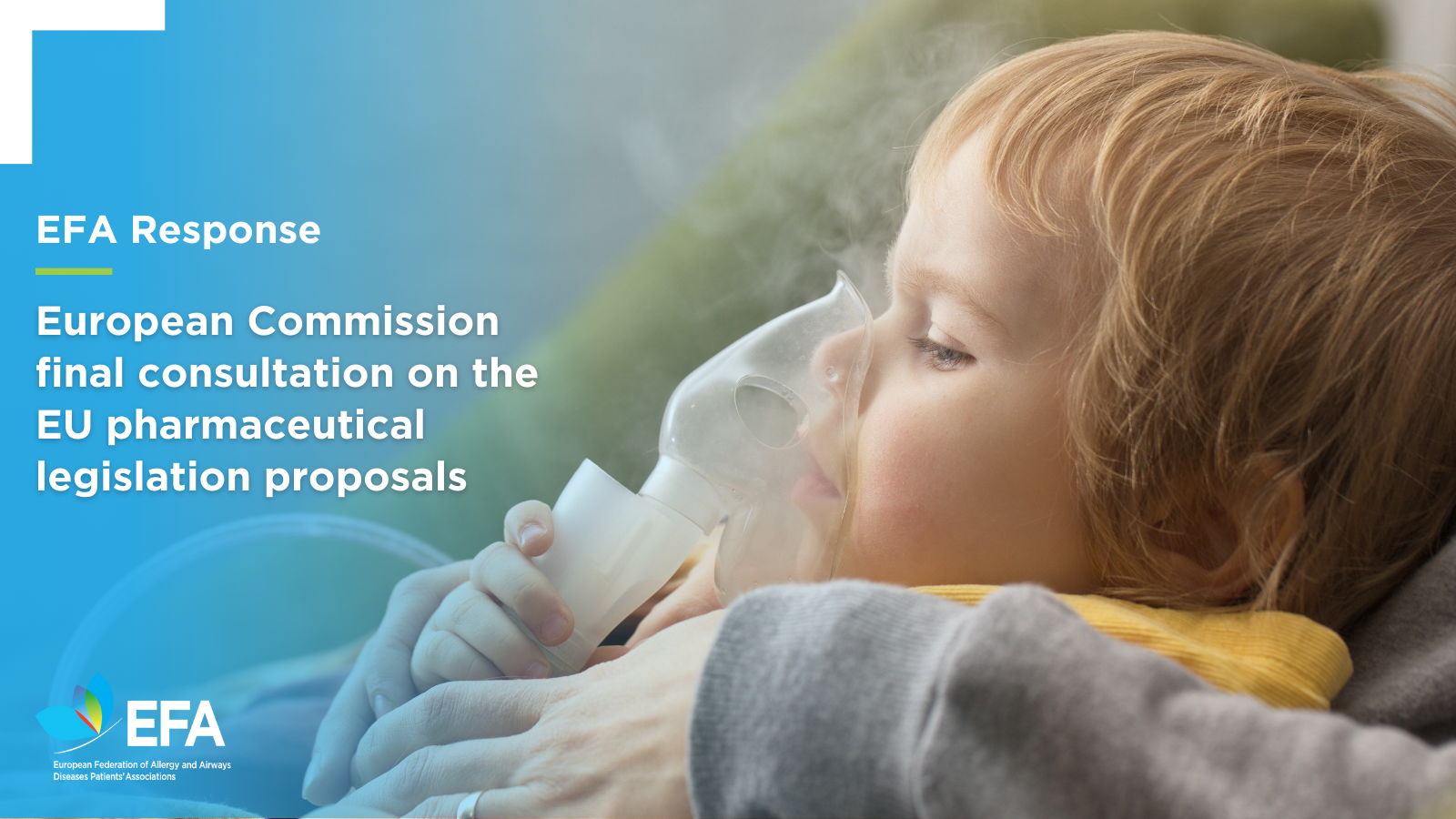In November 2023, EFA responded to the European Commission final consultations on the much-awaited proposals for the revision of the EU general pharmaceuticals legislation. The Commission consulted on both the proposal for a Directive (2023/0132) on medicines, with an emphasis to driving innovation and access towards medicines for children and rare disease patients, and the proposal for a Regulation (2023/0131) on what, how and when are medicines authorised and supervised in the EU.
EFA welcomed the proposed revision of the EU pharmaceutical framework, one of the most impactful EU files in the area of health and certainly impacting allergy, asthma and chronic obstructive pulmonary disease (COPD) patients.
Legislation to boost medicines, with a focus on paediatric and rare diseases
We brought the attention to the Commission to the following points regarding the proposed Directive (2023/0132) on medicines:
An ‘unmet medical needs’ definition that is patient-centred
EFA applauded the Commission efforts to address unmet medical needs (UMN), as well as criteria to assess them (Article 83). However, in addition to addressing the mortality and morbidity associated with a disease, EFA highlighted the importance of looking also at the unmet patients’ needs, such as the disease severity and the disease burden, which are considerably high in patients with chronic diseases and their carers. Moreover, the participation of patients’ organisations in the definition and assessment of UMN is crucial in the process, due to the unique patient experience and perspective.
Electronic package leaflets for medicines should not replace paper leaflets
Package leaflets are a direct information tool for patients using a medicine. While the electronic product information will allow for personalised information, warnings, and easier reporting of adverse effects, EFA highlighted the importance of paper package leaflets, which are indispensable for patients to have easy and efficient access to safety information regarding their medicines. Paper format of package leaflets should remain mandatory generally.
Provide patients with environmental information on medicines
EFA proposed the strengthening of access to environmental information on medicines, such as the public availability of findings of the Environmental Risk Assessment (ERA), as well as informing patients about the storage, deposit, and disposal of a product, including when such product directly contributes to antimicrobial resistance (AMR), environmental pollution and global warming.
Missed opportunity to improve the regulatory process for drug-device combinations and improve patient education
EFA expressed its regret towards the missed opportunity to improve the regulatory process for drug-device combinations and improve patient education. In general, combination products are often developed and evaluated by different authorities under different legislations, but they are then authorised as one product. This situation implies a regulatory divide between medicines and medical devices that might lead to basic patient considerations being forgotten in the regulatory process. Improving the current legislative fragmentation through this directive is therefore paramount, as respiratory and allergy patients rely daily on the use of combination products such as inhalers, pens, auto-injectors, drops, sprays and patches to manage their disease. For EFA, patients’ needs should be evaluated and integrated into the whole development and authorisation process of the combination, and not fragmented as it currently happens.
Legislation updating the authorisation of medicines in the EU
We brought the attention to the Commission to the following points on the Union procedures for the authorisation of the supervision of medicinal products for human use and establishing rules governing the European Medicines Agency.
Welcomed increased patients’ involvement in the overall regulatory process
EFA welcomed the Commission’s proposal to enlarge the patients’ involvement in the regulatory process, through participation at the Committee for Human Medicinal Products (CHMP), and the representation in the Pharmacovigilance Risk Assessment Committee (PRAC), both vital to the work at the EMA.
Illogic loss of paediatric and orphan patient expertise
The step forward proposed for CHMP and PRAC is nevertheless detrimental to the current EMA patients collaboration as the Commission proposes to eliminate the Paediatric Committee (PDCO) and the Committee for Orphan Medicinal Products (COMP). With most rare diseases without an approved treatment, and with children having prescribed medicines which have not been clinically tested to their needs, off label, it is imperative that the expertise and the knowledge of the PDCO and the PRAC are retained.
Opportunity to reinforce the patient voice, expertise and scrutiny
EFA stressed the importance of compensating patients for their contributions and involvement in the work of EMA. Patient representatives or carers who dedicate the time and resources to be involved in the work of the EMA are volunteers who spend a considerable amount of time. They provide this work without any backup due to confidentiality issues and nomination on a personal basis. The involvement of patients must be reasonably compensated for the efforts in preparing, contributing, travelling for, and attending the meetings, which will also increase the patient involvement and ensure independence.
Moving forward with the EU pharmaceutical legislation
At the moment, the revision of the EU pharmaceutical legislation is being discussed at the European Parliament level within the Committee for Environment, Public Health and Food Safety (ENVI), with the first drafts on both proposals of the Commission published in October.
EFA also contributed to informing the European Parliament with recommendations for amendments on the pharmaceutical files from the European Lung Health Group.
EFA will continue to contribute to the discussions on the revision of the EU pharmaceutical framework, monitoring closely the inter-institutional dialogue, and advocate for a patient-centred approach.
You can access the full EFA response to the proposal for a Directive here and the response to the proposal for a Regulation here.
